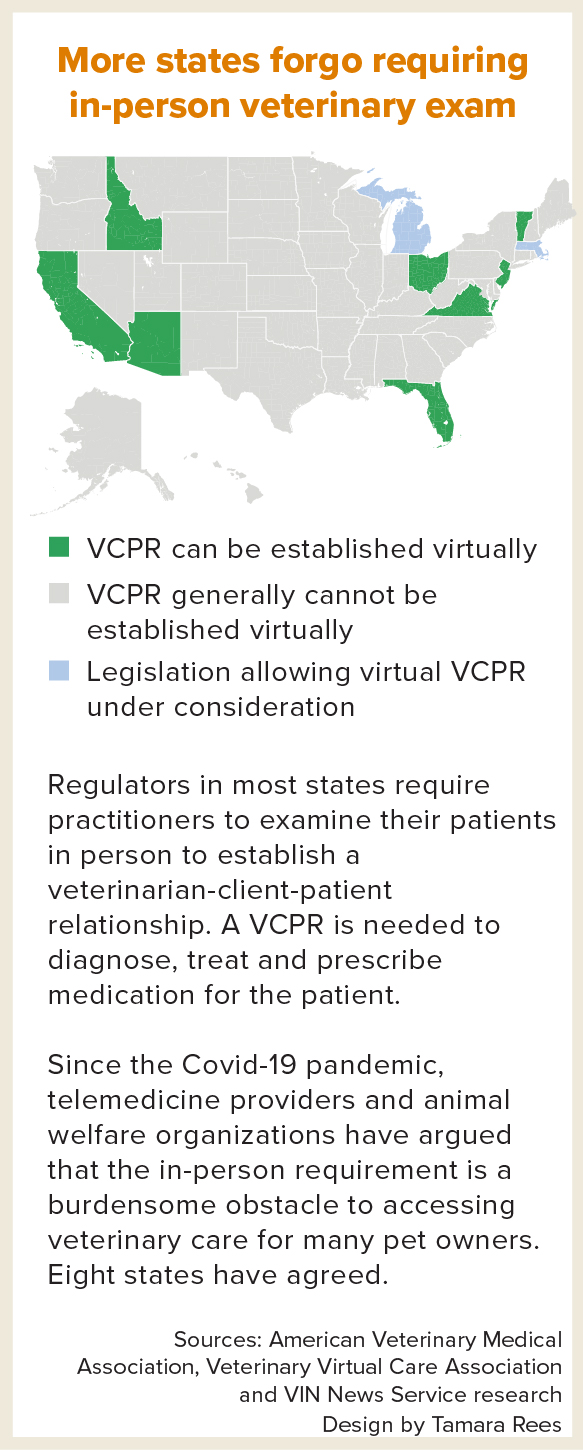 Listen to this story.
Listen to this story.
OhioStateHouse

Photo by Bryan Busovicki/Adobe stock
A bill allowing veterinarians to treat patients via telecommunications technology without first doing an in-person exam passed through the Ohio Statehouse in June.
A new law in Ohio allows veterinarians to treat patients using real-time, virtual methods without first conducting an in-person exam, as was previously required.
The measure, passed as part of a 3,000-plus-page appropriations bill, was signed by the governor on June 30. It takes effect at the end of September.
Ohio is the eighth state to expand the use of telemedicine to treat veterinary patients. Demonstrating a heated battle on the issue, similar attempts in four other states failed this year, and three more states reinforced a commitment to the in-person exam.
The development in Ohio was embraced by animal welfare groups that say the change will improve access and affordability for pet owners, while some Ohio veterinarians expressed concern about overturning what had been considered a bedrock of practice.
Most states require veterinarians to perform an in-person exam to establish a veterinarian-client-patient relationship (VCPR) before treating the patient. The rationale is that, unlike people, nonhuman animals cannot tell doctors how they feel, so a hands-on exam is a foundation for future care.
The Ohio Veterinary Medical Association opposed an early draft of the bill due to concerns about the possibility of antibiotics and other medications being overprescribed, perceived risks to the food supply and the possibility that the measure would allow veterinarians not licensed in the state to practice there.
The association withdrew its opposition after working with bill sponsors to make several changes, according to a letter submitted to the Senate Agriculture and Natural Resources Committee by OVMA Executive Director Christopher Henney.
Changes included limiting the term of prescriptions to no longer than 28 days before an in-person visit is required; prohibiting the use of telemedicine in food production animals unless an in-person VCPR has been established; and restricting the practice of telemedicine to veterinarians licensed by the state.
Six letters in support of the bill were submitted to the committee, including four from veterinarians representing animal welfare groups. Most extolled the bill for expanding access to pet owners living in underserved areas and those facing transportation barriers.
Dr. Allison Lash, medical director of the Cleveland Animal Protective League, highlighted advantages for clients and practitioners in her letter. "The expectation that veterinarians will be available 60+ hours a week, often at the expense of work-life balance, has become increasingly difficult to sustain — especially as a new generation of veterinarians place more value on flexibility and work-life balance," Lash wrote. "At the same time, the demand for accessible, timely care for pets continues to grow. This legislation would help bridge that gap …."
Three Ohio veterinarians submitted letters in opposition. They warned that virtual diagnosis precludes a host of essential diagnostic tools, such as using a stethoscope to listen to the heart, lungs and other vital organs. They warned that there could be missed or misdiagnoses, such as bladder cancer being misperceived as a urinary tract infection.
Dr. Andrea Miller, who owns a practice in Powell, Ohio, said the provision "aims to solve a narrow problem with a broad legislative tool — one that risks eroding the quality of care for the vast majority." She warned, "Telehealth platforms cannot auscultate a heart, palpate a mass, or observe subtle discomfort during movement. These are not minor oversights; they are clinical blind spots."
Trending since the pandemic
Telemedicine_2025_update_D1

Ohio is the eighth state to drop the requirement for an in-person exam in order to treat a patient. The trend accelerated during the Covid-19 pandemic as veterinarians struggled to keep up with demand amid social distancing requirements.
Before Ohio, Florida was the latest state, in 2024, to broadly drop the in-person examination requirement. It was preceded in 2023 by Arizona and California.
Earlier adopters were Idaho, New Jersey, Vermont and Virginia.
The states approach the telemedicine allowance with varying degrees of leniency; much of the variation centers around prescribing. For example, Vermont imposes few restrictions, whereas Idaho prohibits prescribing any drugs if a VCPR is established solely through electronic means. New Jersey and Virginia require in-person exams by veterinarians wishing to prescribe a controlled substance.
Florida mandates an in-person exam to prescribe heartworm medications, controlled drugs, off-label drugs and compounded medications. Other prescription medications are limited to a 14-day supply except for flea and tick treatments, which can be prescribed for up to 30 days. No refills are allowed without an in-person exam.
Similar to Ohio, Arizona limits prescriptions to 14 days, renewable for another 14 days if the patient is revisited remotely. Controlled substances are excluded.
California, too, prohibits prescribed controlled substances through telemedicine. It limits all other prescriptions to six months except for a 14-day limit on antibiotics. Refills require an in-person follow-up.
Activity in other states
Two states, Arkansas and Georgia, have taken a cautious approach to the issue by establishing, this year, limited circumstances under which veterinarians may provide telemedicine without establishing a VCPR in person.
Arkansas allows for it in "emergency or urgent" situations so long as the virtual consultation is followed by an in-person exam within seven days for small animals and 21 days for large animals.
Georgia allows a veterinarian to provide teletriage without an in-person VCPR if no licensed veterinarian or veterinary technician is physically available within a 50-mile radius of the animal's location. The practitioner must request the client present the animal patient for a physical examination as "soon as reasonably practical."
Bills that would allow virtual establishment of a VCPR are in play in Massachusetts and Michigan. Michigan lawmakers are also being asked to consider a bill requiring an in-person exam to establish a VCPR. The competing bills have been sitting in House committees for several months.
Other attempts to relax VCPR rules failed this year in Colorado, New York, Rhode Island and Texas.
At the same time, a handful of states doubled down on the traditional view of the VCPR. Louisiana, North Dakota and South Carolina made more explicit the requirement for an in-person examination as the basis for the VCPR.
Correction: This story has been revised to indicate that listed changes to Georgia's veterinary telehealth regulations apply to teletriage and not telemedicine as first reported.